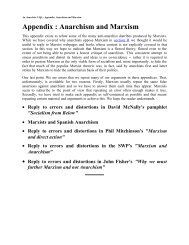Anarchy Works.pdf - Infoshop.org
Anarchy Works.pdf - Infoshop.org
Anarchy Works.pdf - Infoshop.org
You also want an ePaper? Increase the reach of your titles
YUMPU automatically turns print PDFs into web optimized ePapers that Google loves.
economy<br />
<strong>Anarchy</strong> <strong>Works</strong><br />
affects the whole community's standard ofliving, so there is group<br />
pressure to work hard; members work where they choose, and gain<br />
satisfaction from their work; people develop a competitive pride if<br />
their branch of work does better than other branches; people gain<br />
prestige from work because labor is a cultural value.30 As described<br />
above, the ultimate decline of the kibbutz experiment stemmed<br />
largely from the fact that the kibbutzim were socialist enterprises<br />
competing within a capitalist economy, and thus subsumed to the<br />
logic of competition rather than the logic of mutual aid. A Similarly<br />
<strong>org</strong>anized commune in a world without capitalism would not face<br />
these same problems. In any case, unwillingness to work due to lack<br />
of wages was not one of the problems the kibbutzim faced.<br />
Many anarchists suggest that the germs of capitalism are<br />
contained in the mentality of production itself. Whether a given<br />
type of economy can survive, much less grow, within capitalism is<br />
a poor measure of its liberatory potential. But anarchists propose<br />
and debate many different forms of economy, some of which can<br />
only be practiced to a limited extent because they are wholly<br />
illegal within today's world. In the European squatter's movement,<br />
some cities have had or continue to have so many squatted social<br />
centers and houses that they constitute a shadow society. In<br />
Barcelona, for example, as recently as 2008 there were over forty<br />
occupied social centers and at least two hundred squatted houses.<br />
The collectives of people who inhabit these squats generally use<br />
consensus and group assemblies, and most are explicitly anarchist<br />
or intentionally anti-authoritarian. To a large extent, work and<br />
exchange have been abolished from these people's lives, whose<br />
networks run into the thousands. Many do not have wagedjobs, or<br />
they work only seasonally or sporadically, as they do not need to<br />
pay rent. For example the author of this book, who has lived within<br />
30 Melford E. Spiro, Kibbutz: limture in Utopia, New York: Schocken<br />
Books, 1963, pp. 83-85.<br />
this network for two years, has survived for much of that time on<br />
less than one euro a day. Moreover, the great amount of activity<br />
they carry out within the autonomous movement is completely<br />
unwaged. But they do not need wages: they work for themselves.<br />
They occupy abandoned buildings left to rot by speculators, as a<br />
protest against gentrification and as anti-capitalist direct action to<br />
provide themselves with housing. Teaching themselves the skills<br />
they need along the way, they fix up their new houses, cleaning,<br />
patching roofs, installing windows, toilets, showers, light, kitchens,<br />
and anything else they need. They often pirate electricity. water,<br />
and internet, and much of their food comes from dumpster-diving,<br />
stealing, and squatted gardens.<br />
In the total absence of wages or managers, they carry on a<br />
great deal of work, but at their own pace and within the logic of<br />
mutual aid. Besides fixing up their own houses, they also work<br />
for their neighborhoods and enrich their communities. Some<br />
social centers host bicycle repair workshops, enabling people to<br />
repair or build their own bicycles, using old parts. Others offer<br />
workshops on carpentry, self-defense and yoga, natural healing, as<br />
well as libraries, gardens, communal meals, art and theater groups,<br />
language classes, alternative media and counterinformation, music<br />
shows, movies, computer labs where people can use the internet<br />
and learn email security or host their own websites, and solidarity<br />
events to deal with the inevitable repression. Nearly all of these<br />
services are prOVided absolutely free. There is no exchange-one<br />
group <strong>org</strong>anizes to provide a service to everyone, and the entire<br />
social network benefits.<br />
With an astounding amount of initiative in such a passive<br />
society, when squatters regularly get the idea to <strong>org</strong>anize a<br />
communal meal or a bicycle repair shop or a weekly movie shOWing,<br />
they talk with friends and friends of friends until they have enough<br />
people and resources to make their idea a reality, and then they<br />
spread the word or put up posters and hope as many people as<br />
78<br />
79
















